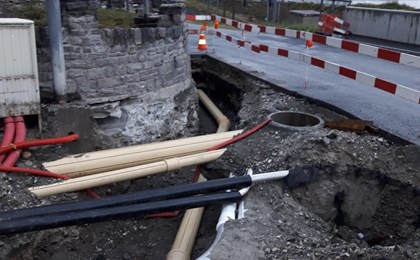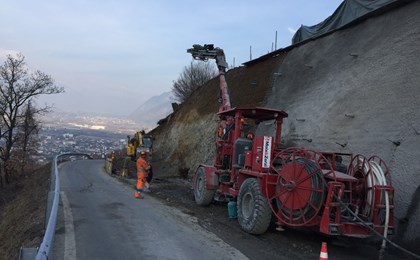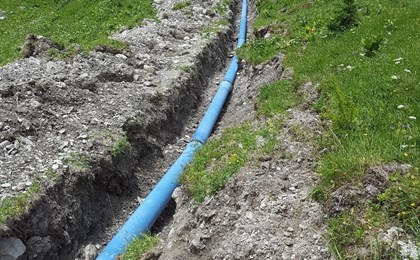Urban hydraulics
Sewage and rainwater networks
Underground networks must be properly dimensioned, built, maintained and, where necessary, optimised and improved to meet the needs of the population.
In the field of drainage, errors in design and construction can have a major influence on the malfunctioning of the network or the connected sewage treatment plant. In general, compliance costs, which can amount to several tens of thousands of francs, are a heavy burden for the community. In many cases, the cause of the problem may even be private and could have been avoided by targeted monitoring.
GEO4ME has been certified as a "Specialist in Private Property Water Disposal" by the Swiss Association of Water Protection Professionals (VSA) and is able to carry out all quality controls relating to projects and works on municipal and private water disposal systems, in particular :
-
- Analysis of the constraints linked to future connections (levels, evacuation system, infiltration, protection zone etc.)
- Checking of calculations and viability (according to SN 592 000)
- Implementation checks (conformity with the project, construction standards, conformity of the connections)
-
- Leak test and/or camera check of the new installation
- Recording the implementation and updating the communal database
- Construction or renovation of phytosanitary stations
For your projects, we model and calculate the dimensions of pipelines and special structures (grit chambers, storm overflows etc.), optimise, plan and monitor works for private or public facilities.
We draw up the necessary master plans for municipalities (e.g. separation of a section of a municipality).
Drinking water and irrigation networks
Water supply networks must be maintained, improved and optimised to meet the needs of the population.
We carry out studies, modelling and work management for the following mandates:
-
Drinking water
- Groundwater catchment
- Penstocks
- Pumping stations
- Water tanks
- Water supply and distribution
- Fire protection
-
Irrigation water
- Groundwater catchment
- Gritters
- Water tanks
- Water supply and distribution (gravity or pressure)
- Sprinkling irrigation
- Frost control
We draw up the necessary master plans for municipalities (e.g. optimisation of the irrigation network for frost control).
Rivers and waterways
Building areas must be protected against the dangers of flooding and debris flows.
GEO4ME carries out studies and management of work for the following mandates:
-
- Canals, torrents and streams :
- safety measures to prevent damage from floods and debris flows
- river revitalisation
- Canals, torrents and streams :
-
- Rehabilitation of dams and traveling screens
- Landslides, wetlands: drainage networks for drying out land
When technical interventions in watercourses are carried out, in addition to safety measures, environmental measures must be planned to mitigate their impact.
In the context of work on canals, torrents or streams, GEO4ME carries out studies and directs the work for environmental measures with a view to restoring the ecological function of the watercourse concerned and improving biodiversity.
Mandates are always handled by a multidisciplinary group of engineers, whose offices have, on many occasions in the past, led the project.
Network status reports
In order for municipalities to be able to carry out their functions, the location, characteristics and value of all public water disposal facilities must be known. A facilities register should take into account all available information: about all public water evacuation installations, the correct connection of properties, surface water and road water evacuation in the respective separate networks.
During a survey of the state of the wastewater and rainwater networks, we collect existing data (videos, execution plans, etc.). We compile this data in order to look for missing information and carry out an on-site survey to complete our database :
-
- Obtaining coordinates, altitudes and characteristics :
- public mixed water, waste and rainwater pipelines
- mixed, waste and rainwater manhole chambers and sewer grates
- special work, e.g. storm overflows, chambers with drains, distribution chambers, double chambers, pumping stations, etc.
- Obtaining coordinates, altitudes and characteristics :
-
- All the different types of installations will be visited:
data sheet and photo shooting.
- All the different types of installations will be visited:
Cette démarche peut être réalisée pour une route, a district or a municipality as a whole.
General Water Drainage Plans (GWDPs)
A GWDP is a tool for the planning, operation, maintenance, renewal and monitoring of water disposal in a municipality. Compared to the former sewer master plan, the volume of work is considerably higher. The GWDP must be reviewed, completed and corrected at regular intervals and updating it is one of the on-going tasks a commune must perform. It must therefore provide an overview of the problems to be solved, thus enabling an effective action plan to be drawn up with full knowledge of the facts. The GWDP must provide an estimate of the costs of the work to be undertaken and serves as a basis for financial planning, self-financing of the sanitation system, a sustainable tax structure of causal and incentive character, and a maximum reduction of financial costs. In this way, it should allow the value of the network to be maintained.
The main objectives of the GWDP are:
-
- To make the most of existing pipelines and size new pipelines according to development objectives
- To impose an adequate collection policy that starts with water management at plot level
- Gradually adapting sanitation systems to new legal and technical requirements
-
- Planning maintenance and renewal work on installations and pipelines
- To maintain the value of sanitation systems
- Targeted, self-financed spending
- To control costs in the long term
During this process, we can carry out the general water evacuation plan by working in collaboration with other offices or by being the design office (BAMO).










